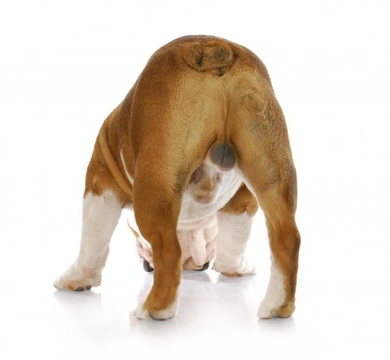
Potential problems with the anal glands in dogs
Most dog owners are familiar with the sight of a dog “scooting” along the ground, paddling their back legs and dragging their butt over a hard surface! This behaviour usually has one of two causes: either the dog has a worm problem and requires prompt worming, or their anal glands are causing them pain or discomfort, which can have various potential causes.
Anal gland impaction is usually the main cause of scooting behaviour and other unusual activities relating to the back end of the dog, which may necessitate an anal gland express or manual emptying to resolve the issue. However, there are various other problems that can crop up now and then with the anal glands too if an impaction is left unchecked, and it is important that you do not overlook these when trying to figure out what is wrong!
Read on to learn more about the most common problems that can affect the anal glands of dogs, and what they mean for the dog in question.
More about the anal glands
Both male and female dogs, neutered and entire, have anal glands; two openings at the sides of the anus, which are scent glands and an important part of canine communication. When your dog poops, the contents of the anal glands are expelled along with the faeces, and generally, you do not need to pay the anal glands any attention when everything is working as it should do!
However, issues with the anal glands can lead to blockages, impactions and other problems, and this is when you might begin to see scooting behaviour, or other odd canine activities that indicate a problem with the back end.
Impaction
Impaction of the anal glands is the most common problem that is likely to affect them, and one that many dogs will suffer from on occasion. Impactions happen when the fluid that fills the anal glands becomes thickened and is unable to be expelled in the normal manner, leading to a build-up within the glands and associated pressure and discomfort.
Impactions can be treated by expressing the anal glands, either by asking your vet to do this for you, or by learning to do it yourself- assuming that you have a strong stomach!
Sacculitis
Sacculitis is an infection of the anal glands, and again, is relatively common among dogs that are prone to anal gland issues. This usually happens in dogs that are prone to impactions, and is generally due to a bacterial infection of the glands, due to their position next to the anus itself. Sacculitis causes the glands themselves and the surrounding area to become sore, inflamed and painful, as well as to possibly swell up. Sacculitis may affect both anal glands together, or just one of them. In order to treat sacculitis, your vet will need to express the anal glands, and also prescribe antibiotics to deal with the infection, and possibly use a saline rinse to flush out any debris within the glands themselves.
Abscesses
Anal gland abscesses can be caused if the glands are infected and not treated, which causes the glands themselves to fill with a foul-smelling pus, which forms an internal abscess. This will be very painful for the affected dog, to the point that the dog may react aggressively if you try to touch their back end. It can also cause a lot of pain when going to the toilet, or problems passing faeces. Left unchecked, it can also lead to fever and potentially blood poisoning, and should be addressed as soon as possible.
If abscesses are not treated, there is a small chance that the body of the dog and the dog’s immune system will be able to fight off the infection and expel the pus on its own, although this will undoubtedly make the dog rather sick and cause a lot of pain in the interim. However, the more likely result is that the abscess or abscesses will grow and grow, increasing in pressure until they ultimately rupture and break the skin.
If you know or suspect that your dog has an anal gland abscess in the making, get them treated as soon as possible to prevent unnecessary pain and sickness.
Anal gland rupture
Left untreated, the most common result of an unchecked anal gland abscess is a rupture, which will cause the anal gland to blow and possibly tear, draining out the blood and pus from within it. This rupture is likely to be extremely messy as well as foul smelling, and while the rupture itself will ease the pressure and provide immediate relief for the dog, nevertheless, it still requires veterinary attention.
Your vet will need to surgically clean and repair the rupture, and treat the affected area with antibiotics, as well as providing oral antibiotics as well. Obviously it is much better not to let a problem escalate until it gets to this stage, as a rupture is a serious business that is both painful for the dog, and potentially expensive to treat!



